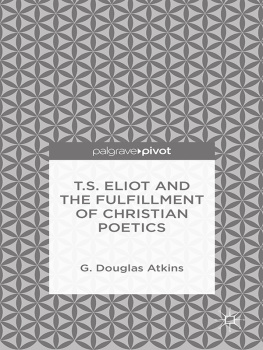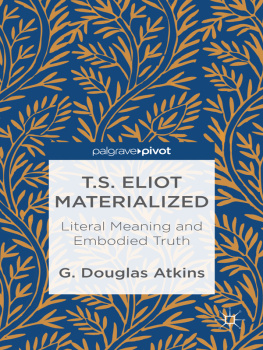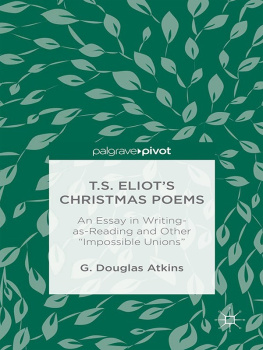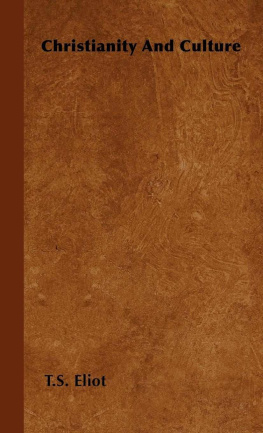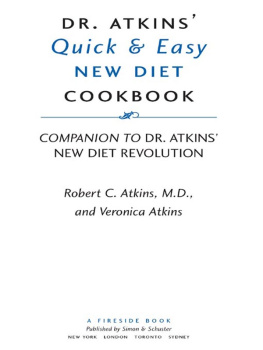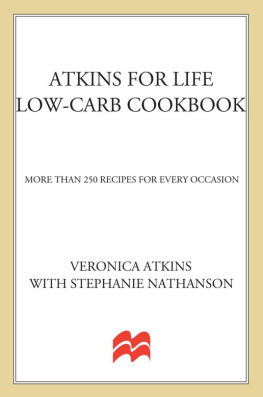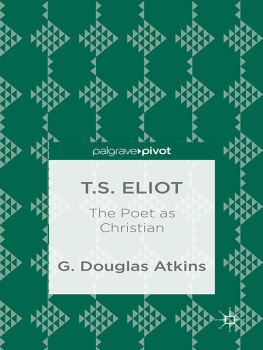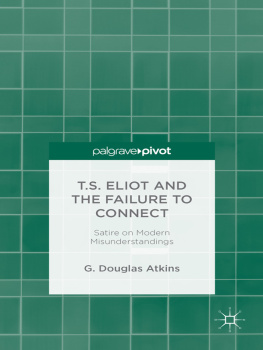Atkins G. Douglas - T.S. Eliot and the Fulfillment of Christian Poetics
Here you can read online Atkins G. Douglas - T.S. Eliot and the Fulfillment of Christian Poetics full text of the book (entire story) in english for free. Download pdf and epub, get meaning, cover and reviews about this ebook. year: 2014, publisher: Palgrave Macmillan, genre: Romance novel. Description of the work, (preface) as well as reviews are available. Best literature library LitArk.com created for fans of good reading and offers a wide selection of genres:
Romance novel
Science fiction
Adventure
Detective
Science
History
Home and family
Prose
Art
Politics
Computer
Non-fiction
Religion
Business
Children
Humor
Choose a favorite category and find really read worthwhile books. Enjoy immersion in the world of imagination, feel the emotions of the characters or learn something new for yourself, make an fascinating discovery.
- Book:T.S. Eliot and the Fulfillment of Christian Poetics
- Author:
- Publisher:Palgrave Macmillan
- Genre:
- Year:2014
- Rating:4 / 5
- Favourites:Add to favourites
- Your mark:
- 80
- 1
- 2
- 3
- 4
- 5
T.S. Eliot and the Fulfillment of Christian Poetics: summary, description and annotation
We offer to read an annotation, description, summary or preface (depends on what the author of the book "T.S. Eliot and the Fulfillment of Christian Poetics" wrote himself). If you haven't found the necessary information about the book — write in the comments, we will try to find it.
T.S. Eliot and the Fulfillment of Christian Poetics — read online for free the complete book (whole text) full work
Below is the text of the book, divided by pages. System saving the place of the last page read, allows you to conveniently read the book "T.S. Eliot and the Fulfillment of Christian Poetics" online for free, without having to search again every time where you left off. Put a bookmark, and you can go to the page where you finished reading at any time.
Font size:
Interval:
Bookmark:
T.S. Eliot and the Fulfillment of Christian Poetics
Also by G. Douglas Atkins
THE FAITH OF JOHN DRYDEN: Change and Continuity
READING DECONSTRUCTION/DECONSTRUCTIVE READING
WRITING AND READING DIFFERENTLY: Deconstruction and the Teaching of Composition and Literature (co-edited with Michael L. Johnson)
QUESTS OF DIFFERENCE: Reading Popes Poems
SHAKESPEARE AND DECONSTRUCTION (co-edited with David M. Bergeron)
CONTEMPORARY LITERARY THEORY (co-edited with Laura Morrow)
GEOFFREY HARTMAN: Criticism as Answerable Style
ESTRANGING THE FAMILIAR: Toward a Revitalized Critical Writing
TRACING THE ESSAY: Through Experience to Truth
READING ESSAYS: An Invitation
ON THE FAMILIAR ESSAY: Challenging Academic Orthodoxies
LITERARY PATHS TO RELIGIOUS UNDERSTANDING: Essays on Dryden, Pope, Keats, George Eliot, Joyce, T.S. Eliot, and E.B. White
T.S. ELIOT AND THE ESSAY: From The Sacred Wood to Four Quartets
READING T.S. ELIOT: Four Quartets and the Journey toward Understanding
E.B. WHITE: The Essayist as First-Class Writer
T.S. ELIOT MATERIALIZED: Literal Meaning and Embodied Truth
SWIFTS SATIRES ON MODERNISM: Battlegrounds of Reading and Writing
ALEXANDER POPES CATHOLIC VISION: Slave to no sect
T.S. ELIOT AND THE FAILURE TO CONNECT: Satire and Modern Misunderstandings
T.S. ELIOT, LANCELOT ANDREWES, AND THE WORD: Intersections of Literature and Christianity
SWIFT, JOYCE, AND THE FLIGHT FROM HOME: Quests of Transcendence and the Sin of Separation
T.S. ELIOT: The Poet as Christian

T.S. Eliot and the Fulfillment of Christian Poetics
G. Douglas Atkins


T.S. ELIOT AND THE FULFILLMENT OF CHRISTIAN POETICS
Copyright G. Douglas Atkins, 2014.
All rights reserved.
First published in 2014 by
PALGRAVE MACMILLAN
in the United Statesa division of St. Martins Press LLC,
175 Fifth Avenue, New York, NY 10010.
Where this book is distributed in the UK, Europe and the rest of the world, this is by Palgrave Macmillan, a division of Macmillan Publishers Limited, registered in England, company number 785998, of Houndmills, Basingstoke, Hampshire RG21 6XS.
Palgrave Macmillan is the global academic imprint of the above companies and has companies and representatives throughout the world.
Palgrave and Macmillan are registered trademarks in the United States, the United Kingdom, Europe and other countries.
ISBN: 9781137466204 EPUB
ISBN: 9781137466259 PDF
ISBN: 9781137470836 Hardback
Library of Congress Cataloging-in-Publication Data is available from the Library of Congress.
A catalogue record of the book is available from the British Library.
First edition: 2014
www.palgrave.com/pivot
DOI: 10.1057/9781137466259
Contents
Preface and Acknowledgments
T.S. Eliot and the Fulfillment of Christian Poetics is the third work in a trilogy that began with a study of Eliot and Lancelot Andrewes, the great seventeenth-century Anglican divine whom he rescued from relative oblivion and who was instrumental in the poets embrace of Anglo-Catholicism. Eliot derived from Andrewess sermons a poetics that, I have argued, marks the way of writing that appears in the post-conversion poems (the Ariel poems and Ash-Wednesday) and that differs from the less verbal, less comparative, and less meditative character of the verses written before 1927, the year of his baptism into the Church of England. Another way of putting it: Eliots pre-1927 poems play the Old Testament to the New that appears in the poems written after his conversion, which fulfill the law present in the earlier. For many reasons, Four Quartets deserves extended treatment; and commentary on it here completes my account of T.S. Eliot: The Poet as Christian.
I feel the need to acknowledge that I am here returning to a work on which I have already written quite a lot, covering again ground that I have explored before. The simple fact is, I keep on essaying, that is, trying: considering this inexhaustible work from different and fresh perspectives, seeking to understand Eliots words. I want to assure you, gentle reader, that what you have in your hands represents a refining of approach that yields something quite different from rehashed material: the ancient rhyme in new perspective, to modify Eliot himself in Ash-Wednesday: Six Poems. My focus is how each poem of Four Quartets works, what it means, that and how it matters (so much), and how each of these parts supports the others, right in participating in the creation of a structure whose details we fully appreciate only at the end, the place from which we begin in order to appreciate fully those magnificent details. The issue is fulfillmentof purpose. It is only by writing that I can hope to approach Eliots meaning and his own understanding.
I admit that as I have proceeded in this effort over the years, I have been wrong, more than once or twice, alas, and so I attempt, unabashedly, to issue corrections. My understanding of the still is unstill, ever moving. To reach a perfect understanding of a text, especially one as complex and explicitly challenging as Four Quartets, would be to transcend time, for the poem, like everything else made of words, consists of that which constitutes the details of the pattern whose still point is available only to God Who stands outside time and can apprehend the pattern that those un-still words make. I can but fare forward, perhaps apprehending (anew) how this detail and that detail work together, how they help to constitute the pattern, the idea of which I have perhaps caught. But I cannot stop timeand Eliot teaches us to (try to) go beyond the desire to want to do so.
The result is commentarythe product of close textual analysis, comparison, and meditation. Commentary is neither identical to the text nor separate from it. To be sure, the text can stand alone, but commentary may be read, not as the primary texts destruction nor as a transcendence of it, but as its fulfillment. Here, too, there is a forwardrather than Prufrockian and crab-likemovement, the ancient rhyme (to adapt Ash-Wednesday) faithfully adhered to and/but represented in new manner. In commentary, the reader (thus) figures prominently, for it is the record of the texts intersection with him or her.
Commentary is, in the final analysis, about the texts ultimate effects on the receiver and respondent (in line with the speakers change dramatized in Journey of the Magi). Commentary thus represents both affect and effect. It rests upon a foundation of humility, constituting the record of the readers response to the text, and that response necessarily involves submission to the text, which (paradoxically) yields the readers freedom (to respond). The text is, we may say, thus embodied in the commentary as well as fulfilled there.
Amidst all this close attention to words (qua words), all this theological and philosophical talk, all this surmise about the Ultimate, I write in hopes of enhancing your pleasure, dear reader, in reading Eliots great essay-poem, its often prose-like verses. I seek to share with you the great pleasure (never separable from understanding) that I take in reading, re-reading, and meditating upon the words burning with meaning in
Next pageFont size:
Interval:
Bookmark:
Similar books «T.S. Eliot and the Fulfillment of Christian Poetics»
Look at similar books to T.S. Eliot and the Fulfillment of Christian Poetics. We have selected literature similar in name and meaning in the hope of providing readers with more options to find new, interesting, not yet read works.
Discussion, reviews of the book T.S. Eliot and the Fulfillment of Christian Poetics and just readers' own opinions. Leave your comments, write what you think about the work, its meaning or the main characters. Specify what exactly you liked and what you didn't like, and why you think so.

